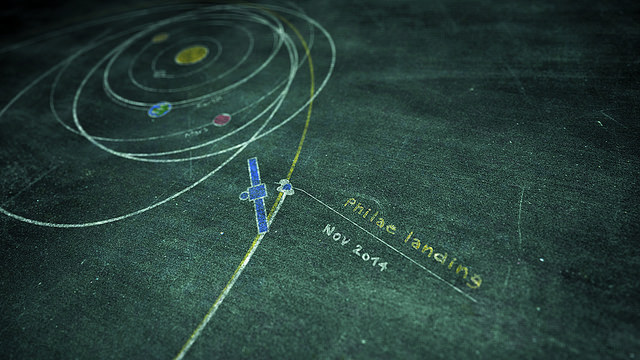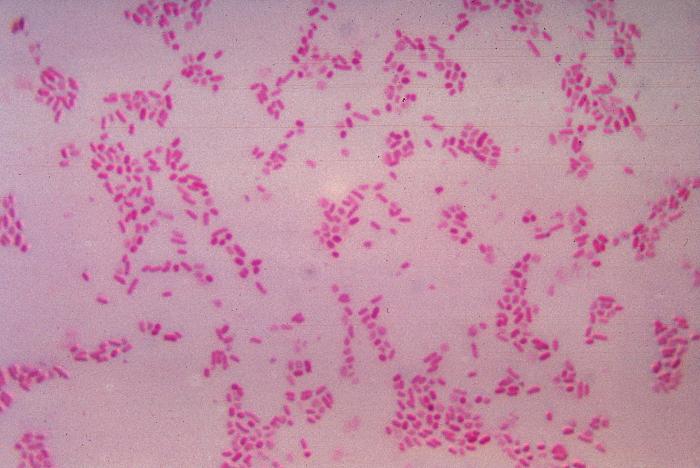
It’s been quite a week and there’s a lot to cover. Rosetta’s end-of-mission plan has been decided, CBS has announced a new Star Trek show that’s kinda-sorta going to be on TV, and the LHC is going to be getting another upgrade, so we’d better get started. Read on.
***
Rosetta’s End

In September of 2016, the funding for the Rosetta mission to comet 67P/Churyumov-Gerasimenko will come to an end. This is unsurprising, of course, because by that time the probe, and the comet it orbits, will have travelled too far from the sun to function. In preparation for this, the team of ESA scientists and engineers who have been using the probe to study 67P since it achieved orbit in August of 2014 have released their final plans for Rosetta: the probe will have a permanent home on the surface of the comet. According to Nature News, the team is working on a new series of orbits that will carry Rosetta closer and closer to the comet until it reaches the surface. “Once we touch, hit or crash, whatever you want to call it, it’s game over,” says spacecraft operations manager Sylvain Lodiot. Even if it survives the collision, it won’t be able to redirect its solar panels to point to the sun, or point its antenna home. But on the way down, Rosetta should be able to capture its best readings ever — from 500 meters up, the resolution of its photos will be one centimeter per pixel, and it should be able to detect the different gases coming from the two “lobes” of the comet. It’s going to be a sad end for Rosetta, but a productive one. Nature News has more on the story.
To Boldly Go Once Again

This week we found out that there’s finally going to be a new Star Trek television series, after a decade without anything to go on but the Abramsverse movies and the surprisingly well-done Axanar fan productions. It’s coming in 2017, and aside from its method of distribution, there’s not much we know. Here’s a link to the press release, but all in all there are only a couple of passages worth reading. First, after the first episode premieres on CBS, it’ll only be available to subscribers to CBS’s own hulu/netflix-wannabe, “CBS All Access.” That means, in the US at least, if you want to watch it, you’re going to be paying $7 a month for at best one episode a week of television (or, of course, piracy. Gee I wonder which will be the more likely route to access for most viewers). Second, and this is only based on a tiny snippet of text, I don’t think it’s going to be set in the Abramsverse. The press release is 99% “how awesome is CBS All Access” and 1% details, but it does end with the following line: “The new television series is not related to the upcoming feature film Star Trek Beyond which is scheduled to be distributed by Paramount Pictures in summer 2016.” Now I don’t know for sure that “unrelated” means “Prime Universe,” and it’s possible it just means “elsewhere in the Abramsverse,” but a guy can hope, right?
In other television news, Philip Pullman’s “His Dark Materials” trilogy looks to be getting its own BBC series, hopefully erasing the Hollywood travesty once and for all from our memories.
High Luminosity LHC

A three-day meeting this week marked the end of the planning phase for the next scheduled upgrade to the Large Hadron Collider, called the “High-Luminosity LHC.” Scheduled to be fully implemented by 2025, the Hi-Lum LHC will involve adding even more powerful superconducting magnets and specially designed beam manipulators called “crab cavities” all with the purpose of increasing the number of collisions per second from one billion to five. It’s hoped that with the increase in collisions, the souped-up LHC will be able to explore the new areas of physics that its current incarnation is in the process of discovering. With the planning phase over, the CERN and its partners will now begin the “prototyping and industrialization” phase of the improvements. Check out the press release for more information.
Gut Bacteria and Cancer

In a discovery that’s yet to be fully explained, a team of researchers has discovered that the efficacy of certain new anti-cancer immunotherapy drugs seems to hinge on the presence of certain bacteria in the gut. According to this thorough writeup in The Atlantic, these immuotherapy drugs are much more effective in some patients than others, and the research seems to be pointing quite directly at the presence of certain microbes in the patients’ gut as the reason why. The exact mechanism is still under study, but it seems once again to suggest that the things living alongside us (that is, inside us) are more important than we used to think. Check out The Atlantic for more.
ICYMI
In case you didn’t see all the stories here at This Week In Tomorrow this week, here’s a rundown in point-form:
- On Monday, I suggested a concept for a new ghost hunting TV show
- On Tuesday, I explained a new NASA study that seems to show Antarctic ice mass increasing
- On Wednesday, I took a look at offshore wind as a part of my ongoing series on the future of power generation
- On Thursday, I pointed out that, no, once again, the EMDrive hasn’t been “confirmed,” and
- On Friday, Lindsey covered the recent story of the NYC MTA having a problem with grapefruits and the word “period.“
If you missed any of them, go check ’em out!
Best of the Rest
As usual, there’s far too much to get to every week. So here’s your weekly linkspam to round things out.
- A new study suggests that nonreligious children are more altruistic and less judgey
- The makers of the camera you can focus after you take the picture have made a rig for filming VR
- The Bitcoin symbol is coming to Unicode at last
- The ISS has been crewed for fifteen years
- There’s a new hole in the ground in Yellowstone
- The biggest imaginary world ever is coming soon in No Man’s Sky
- Toyota is putting a billion dollars into AI research
- Virgin Galactic may be returning to the sky next year, and
- Bill Nye got memed
That’s all for this week. I’ll leave you with a video making the rounds, produced by one Tyler Novo, about how your badass little teddy bear fights the monsters under your bed while you sleep. You can thank him later.
Don’t forget to like This Week In Tomorrow on Facebook and follow me on Twitter @TWITomorrow. Have a great week.
